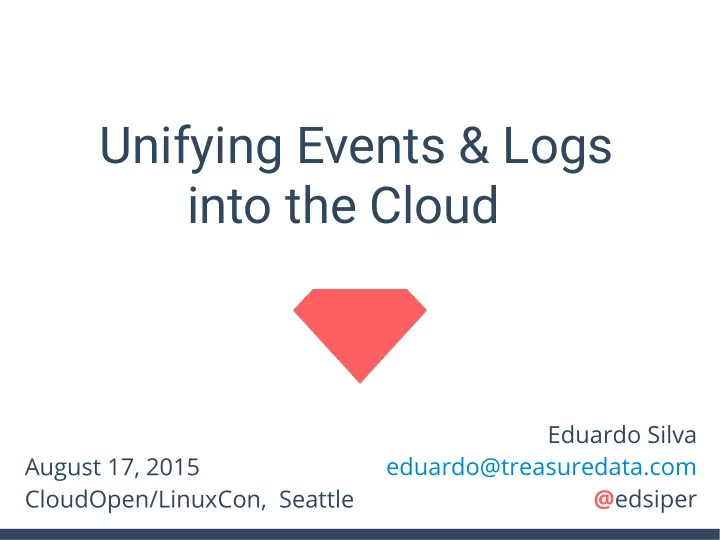

Unifying Events & Logs into the Cloud Eduardo Silva August 17, 2015 eduardo@treasuredata.com CloudOpen/LinuxCon, Seattle @ edsiper
About Me Eduardo Silva ● Github & Twitter @edsiper ● Personal Blog http://edsiper.linuxchile.cl Treasure Data ● Open Source Engineer ● Fluentd / Fluent Bit http://github.com/fmuent Projects ● Monkey HTTP Server http://monkey-project.com ● Duda I/O http://duda.io
Logging
Logging Matters Pros ● Application status ● Debugging ● General information about anomalies: errors ● Troubleshooting / Support ● Local or Remote (network)
Logging Matters From a business point of view ● Input data Analytics → ● User interaction / behaviors ● Improvements
Assumptions
Logging Matters Assumptions ● I have enough disk space ● I/O operations will not block ● Log messages are human readable ● My logging mechanism scale
Logging Matters Assumptions Basically, yeah.. it should work.
Concerns
Logging Matters Concerns ● Logs increase = data increase ● Message format get more complex ● Did the Kernel fmush the bufgers ? (sync(2)) ● Multi-thread application ?, locking ? ● M ultiple Applications = M ultiple Logs
Logging Matters Concerns If M ultiple Applications = M ultiple logs M ultiple Hosts x M ultiple Applications = ???
OK, so: 1. Logging matters 2. It's really benefjcial 3. but...
It needs to be done right.
Logging Common sources & inputs ● Application Logs ● Apache ● NginX ● Syslog (-ng) ● Custom applications / Languages ● C, Ruby, Python, PHP, Perl, NodeJS, Java, etc.
In a galaxy not so far away...
How to parse/store multiple data sources ? note: performance matters!
Fluentd is an open source data collector It let's you unify the data collection for a better use and understanding of data.
before
after
Fluentd Highlights ● High Performance ● Built-in Reliability ● Structured Logs ● Plug gable Architecture ● More than 300 plugins! (input/fjltering/output)
Fluentd Architecture
Fluentd Internals simplifjed
Fluentd Input plugins
Fluentd Output plugins
Fluentd Buffer plugins
Fluentd Buffer plugins
M x N → M + N
Fluentd Simple Forwarding
Fluentd Simple Forwarding: confjguration # logs from a fjle # store logs to MongoDB <source> <match backend.*> type tail type mongo path /var/log/httpd.log database fmuent format apache2 collection test tag backend.apache </match> </source> # logs from client libraries <source> type forward port 24224 </source>
Fluentd Less Simple Forwarding
Fluentd Lambda Architecture
Fluentd # logs from a fjle # store logs to MongoDB <source> <match *.*> type tail type copy path /var/log/httpd.log <store> format apache2 type elasticsearch tag backend.apache logstash_format true </source> </store> # logs from client libraries <store> <source> type webhdfs type forward host 192.x.y.z port 24224 port 50070 </source> path /path/to/hdfs </store> </match>
Who uses Fluentd in production ?
We collect 800k events per second !
Internet of Things
Internet of Things Facts ● IoT will grow to many billions of devices over the next decade. ● Now it's about device to device connectivity. ● Difgerent frameworks and protocols are emerging. ● It needs Logging .
Internet of Things Alliances Vendors formed alliances to join forces and develop generic software layers for their products:
Internet of Things Solutions provided Alliance Framework → →
IoT & Big Data Analytics IoT requires a generic solution to collect events and data from difgerent sources for further analysis. Data can come from a specifjc framework, radio device, sensor or other. How do we collect and unify data properly ?
@fluentbit
Fluent Bit is an open source data collector It let's you collect data from IoT/Embedded devices and transport It to third party services.
Fluent Bit Targets ● Services ● Sensors / Signals / Radios ● Operating System information ● Automotive / Telematics
Fluent Bit Requirements IoT and Embedded environment requires special handling, specifjcally on performance and resource utilization: ● Lightweight ● Written in C Language ● Customizable, pluggable architecture ● Full integration with Fluentd
Fluent Bit Integration
Fluent Bit Direct Output
Containers
Docker Logging driver ● Docker v1.6 released the concept of logging drivers ● Route container output ● Fluentd ?
Docker
Docker v1.8 Fluentd Logging driver!
We Love Data! ● http://fmuentd.org ● http://fmuentbit.io ● https://docs.docker.com/reference/logging/fmuentd/ ● http://github.com/fmuent/fmuentd Thank you!
Recommend
More recommend